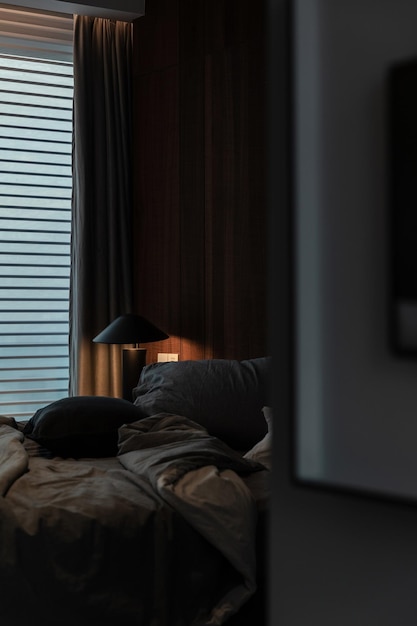Improve Your Sleep: 3 Simple Changes for a Restful Night

Improve your sleep quality tonight by making simple changes to your routine, focusing on creating a relaxing environment, optimizing your diet and exercise, and establishing healthy pre-bedtime habits.
Are you tired of tossing and turning all night? Do you dream of waking up refreshed and energized? You can improve your sleep quality: 3 simple changes for a restful night, starting tonight, can make a world of difference in your overall well-being.
Understand Your Sleep Needs
Before diving into specific changes, it’s important to understand that everyone’s sleep needs are different. Factors such as age, activity level, and overall health can influence how much sleep you require each night. Understanding your unique needs helps in tailoring a sleep routine that works best for you.
While the general recommendation is 7-9 hours of sleep for adults, some may thrive on less, while others need more. Pay attention to how you feel throughout the day. If you’re constantly fatigued, it might be a sign that you need more sleep.
The Importance of Sleep Hygiene
Sleep hygiene refers to habits and practices that are conducive to sleeping well on a regular basis. Good sleep hygiene involves creating a comfortable sleep environment, maintaining a regular sleep schedule, and avoiding stimulants before bed. It’s the foundation upon which better sleep is built.
Factors Affecting Sleep Quality
Several factors can disrupt your sleep quality, including stress, diet, physical activity, and exposure to screens. Addressing these factors can significantly improve your ability to fall asleep and stay asleep throughout the night. Identifying your personal disruptors is the first step towards a more restful night.

Ultimately, understanding your sleep needs and the factors that affect your sleep quality is crucial for making informed decisions about your sleep routine. By prioritizing sleep hygiene and addressing potential disruptors, you can unlock the door to more restful and rejuvenating nights.
Create a Relaxing Bedtime Routine
A consistent and relaxing bedtime routine signals to your body that it’s time to wind down and prepare for sleep. Establishing a routine helps regulate your body’s natural sleep-wake cycle, making it easier to fall asleep and wake up at consistent times. This sets the stage for more restful sleep.
Your bedtime routine should be calming and enjoyable. Avoid activities that are stimulating or stressful, such as working or watching intense TV shows. Instead, focus on activities that promote relaxation and tranquility.
Ideas for a Relaxing Routine
Consider incorporating activities such as reading a book, taking a warm bath, listening to calming music, or practicing gentle stretching or yoga. Anything that helps you relax and unwind can be a beneficial addition to your bedtime routine. Experiment to find what works best for you.
The Importance of Consistency
Consistency is key when it comes to a bedtime routine. Try to go to bed and wake up at the same time every day, even on weekends, to regulate your body’s natural sleep-wake cycle. This consistency reinforces your body’s internal clock and promotes better sleep quality.
- Set a regular sleep schedule: Go to bed and wake up at the same time every day, even on weekends.
- Create a calming environment: Make sure your bedroom is dark, quiet, and cool.
- Avoid screen time before bed: The blue light emitted from electronic devices can interfere with your sleep.

Creating a relaxing bedtime routine is a simple yet powerful way to improve your sleep quality. By choosing calming activities, maintaining consistency, and creating a sleep-conducive environment, you can prepare your body and mind for a restful night and wake up feeling refreshed and energized.
Optimize Your Diet and Exercise
What you eat and how you move your body throughout the day can significantly impact your sleep quality. Making mindful choices about your diet and exercise habits can promote better sleep and overall well-being. A balanced approach is key to achieving optimal results.
Diet and exercise influence your body’s natural rhythms and hormone levels, which in turn affect your ability to fall asleep and stay asleep. By understanding these connections, you can make informed decisions about your lifestyle.
Foods to Avoid Before Bed
Certain foods and beverages can disrupt your sleep, particularly when consumed close to bedtime. These include caffeine, alcohol, and heavy, fatty meals. These substances can interfere with your body’s natural sleep processes.
The Benefits of Regular Exercise
Regular physical activity can promote better sleep, but it’s important to time your workouts appropriately. Avoid intense exercise close to bedtime, as it can be stimulating and interfere with your ability to fall asleep. Aim for moderate exercise earlier in the day.
- Avoid caffeine and alcohol before bed: These substances can disrupt your sleep cycle.
- Eat a light dinner: Avoid heavy, fatty meals close to bedtime.
- Exercise regularly: Aim for at least 30 minutes of moderate exercise most days of the week, but avoid intense workouts close to bedtime.
Optimizing your diet and exercise habits is crucial for achieving restful sleep. By avoiding disruptive substances, making mindful food choices, and engaging in regular physical activity, you can positively influence your body’s natural sleep-wake cycle and enhance your overall sleep quality. These changes contribute to feeling more energized and refreshed each day.
Create a Sleep-Conducive Environment
Your bedroom environment plays a crucial role in determining the quality of your sleep. Creating a space that is dark, quiet, and cool can significantly enhance your ability to fall asleep and stay asleep throughout the night. The ideal sleep environment promotes relaxation and minimizes distractions.
Think of your bedroom as a sanctuary dedicated to rest and rejuvenation. By controlling factors such as light, noise, and temperature, you can optimize your sleep environment and promote more restful nights.
The Importance of Darkness
Darkness signals to your brain that it’s time to release melatonin, the hormone that regulates sleep. Invest in blackout curtains or blinds to block out external light sources. Minimizing light exposure promotes a deeper and more restful sleep. Even small amounts of light can disrupt your sleep cycle.
Reducing Noise Pollution
Noise can be a major disruptor to sleep. Use earplugs, a white noise machine, or a fan to mask distracting sounds. Creating a quiet environment helps you fall asleep more easily and stay asleep throughout the night. Consider soundproofing measures if you live in a noisy area.
Temperature Regulation
A cool room is ideal for sleep. Most experts recommend setting your thermostat between 60-67 degrees Fahrenheit (15-19 degrees Celsius). A cooler temperature helps lower your body temperature, signaling to your brain that it’s time to sleep. Adjust bedding to maintain comfortable warmth.
Creating a sleep-conducive environment is a fundamental step in improving sleep quality. By controlling light, noise, and temperature, you can transform your bedroom into a sanctuary for restful and rejuvenating sleep. These environmental adjustments contribute to waking up feeling refreshed and ready to tackle the day.
Manage Stress and Anxiety
Stress and anxiety are common culprits behind sleepless nights. Learning how to manage these emotions effectively can significantly improve your sleep quality and overall well-being. Addressing the root causes of stress is a vital part of the process.
Chronic stress and anxiety can disrupt your body’s natural sleep-wake cycle and make it difficult to fall asleep and stay asleep. By incorporating stress-reducing techniques into your daily routine, you can promote more restful and rejuvenating nights.
Mindfulness and Meditation
Mindfulness and meditation practices can help calm your mind and reduce feelings of stress and anxiety. Even a few minutes of daily meditation can make a noticeable difference in your ability to relax and fall asleep. These practices promote a sense of inner peace and tranquility.
Relaxation Techniques
There are many relaxation techniques that can help you unwind before bed, such as deep breathing exercises, progressive muscle relaxation, and guided imagery. Experiment to find the techniques that work best for you. These methods help calm your nervous system and prepare your body for sleep.
- Practice mindfulness and meditation: These techniques can help calm your mind and reduce stress.
- Try relaxation techniques: Deep breathing, progressive muscle relaxation, and guided imagery can promote relaxation.
- Keep a journal: Writing down your thoughts and feelings can help you process emotions and reduce anxiety.
Managing stress and anxiety is essential for promoting restful sleep. Integrating mindfulness, relaxation techniques, and journaling into your routine can help you regain control over your emotions and transform sleepless nights into peaceful and rejuvenating sleep. Addressing stress contributes to feeling more balanced and energized throughout the day.
Seek Professional Help When Needed
If you’ve tried various strategies to improve your sleep quality and are still struggling with persistent sleep problems, it may be time to seek professional help. Sleep disorders can have a significant impact on your health and well-being, and a healthcare professional can help you identify and address any underlying issues.
Recognizing when to seek professional help is crucial for ensuring that you receive the appropriate diagnosis and treatment. Don’t hesitate to reach out to a doctor or sleep specialist if you’re concerned about your sleep.
Signs You Should See a Doctor
There are several signs that indicate you should seek professional help for your sleep problems. These include difficulty falling asleep or staying asleep, excessive daytime sleepiness, snoring loudly, and experiencing pauses in breathing during sleep. These symptoms may indicate an underlying sleep disorder that requires medical attention.
Available Treatment Options
A variety of treatment options are available for sleep disorders, ranging from lifestyle changes and behavioral therapies to medications and medical devices. Your healthcare provider can help you determine the best course of treatment based on your individual needs and circumstances. Treatment may involve addressing underlying medical conditions, improving sleep hygiene, or using specific therapies to promote better sleep.
Finally, don’t underestimate the power of seeking professional advice when needed. While these simple changes can make a big difference, sometimes underlying issues require expert attention to resolve.
“`html
| Key Point | Brief Description |
|---|---|
| 🌙 Bedtime Routine | Establish a relaxing pre-sleep routine to signal your body it’s time to wind down. |
| 🥗 Diet & Exercise | Optimize sleep quality by avoiding caffeine and heavy meals before bed, and exercising regularly. |
| 🛏️ Sleep Environment | Create a dark, quiet, and cool bedroom to promote restful sleep. |
| 🧘 Stress Management | Use mindfulness, relaxation, and journaling to reduce pre-sleep stress and improve sleep. |
“`
Frequently Asked Questions
▼
It is recommended to stop using electronic devices at least one to two hours before bedtime. The blue light emitted from screens can interfere with the body’s natural sleep-wake cycle by suppressing melatonin production.
▼
The generally recommended ideal room temperature for sleep is between 60 to 67 degrees Fahrenheit (15 to 19 degrees Celsius). This cooler temperature helps facilitate the body’s natural temperature drop as it prepares for sleep.
▼
Yes, napping during the day can affect your sleep at night, especially if naps are long or taken late in the afternoon. Short naps earlier in the day are less likely to disrupt nighttime sleep.
▼
It’s best to avoid caffeine, alcohol, and heavy, fatty meals close to bedtime. These substances can disrupt your sleep patterns and make it harder to fall and stay asleep throughout the night.
▼
Managing racing thoughts can involve techniques like journaling, mindfulness, and relaxation exercises. These practices can help calm your mind and reduce anxiety, making it easier to drift off to sleep peacefully.
Conclusion
Improving your sleep quality is within your reach. By integrating these three simple changes – establishing a relaxing bedtime routine, optimizing your diet and exercise, and creating a sleep-conducive environment – you can transform your nights and wake up feeling refreshed. Prioritize these habits, and you’ll be on your way to more restful, rejuvenating sleep, starting tonight.